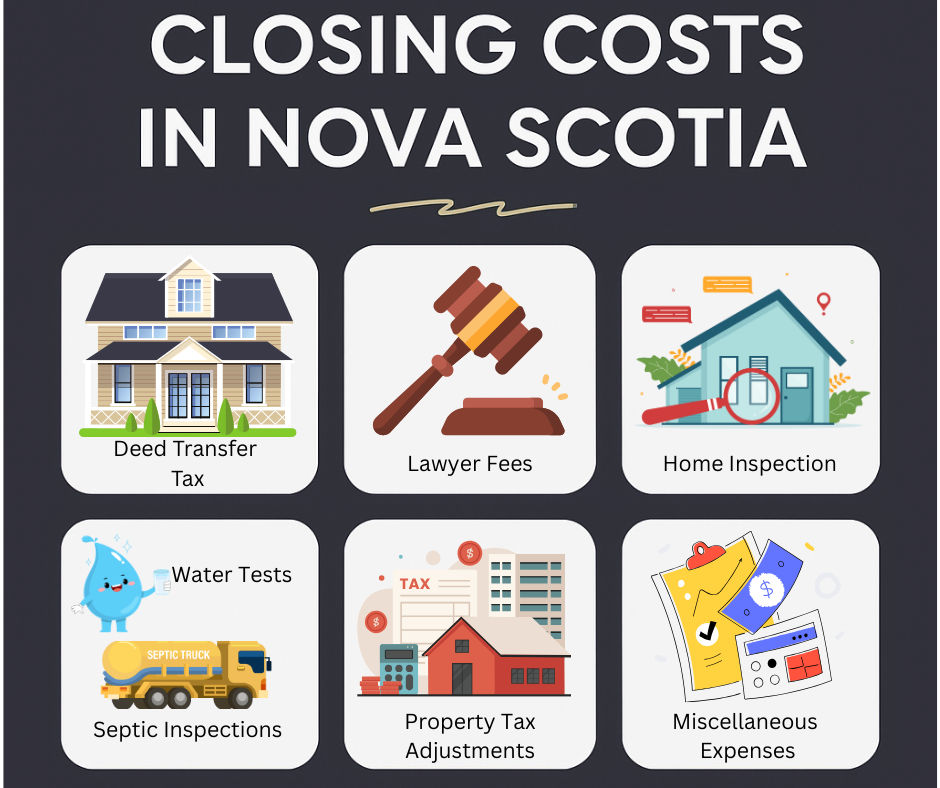
🏡 Closing Costs When Buying a Home in Nova Scotia
When purchasing a home in Nova Scotia, it's essential to budget for more than just the purchase price. Closing costs can add up, and a good rule of thumb is to set aside approximately 2.5-3% of the purchase price to cover these expenses. Check out our FREE Calculator Hub for easy-to-use Mortgage, Purchase Costs, Closing Costs, Land/Deed Transfer and Maximum Mortgage Calculators.
For example, on a $500,000 home, you should budget about $12,000 - $15,000 +/- for closing costs, plus your down payment.
Here's a detailed breakdown of what to expect:
💼 1. Lawyer Fees
- Legal fees for buying a home typically range from $1,000 to $1,500
- Additional costs, such as mortgage registration (about $75), bring the total to approximately $1,200 to $1,800
- For a list of lawyers, visit the Nova Scotia Barristers' Society at www.nsbs.org
💰 2. Property Taxes
- Property taxes are paid every October and April
- At closing, there will be an adjustment based on the time of year and the property's tax amount
- Example: If annual property taxes are $2,400, $1,200 is paid in April and $1,200 in October. If you close in May, you reimburse the seller for about five months of taxes (approximately $1,000 ) and then prepare for your October payment
- Most lenders manage property tax payments for you
- More information about Property Taxes is available here
📝 3. Deed Transfer Tax (DTT)
The Deed Transfer Tax is a one-time fee paid by the buyer at closing, calculated as a percentage of the purchase price or assessed value (whichever is higher). Each municipality in Nova Scotia sets its own rate, usually between 0.5% and 1.5%. Click here for an article about deed transfer tax.
Example: In Halifax Regional Municipality (HRM), the rate is 1.5%, so a $500,000 home would incur a $7,500 DTT, collected by your lawyer and paid to the municipality.
Deed Transfer Tax Rates by Municipality
| Municipality/Community | Deed Transfer Tax Rate |
|---|---|
| Halifax Regional Municipality | 1.5% |
| Municipality of the County of Annapolis | 1.5% |
| Town of Annapolis Royal | 1.5% |
| Town of Middleton | 1.5% |
| Municipality of the County of Antigonish | 1.0% |
| Town of Antigonish | 1.5% |
| Cape Breton Regional Municipality | 1.5% |
| Municipality of Colchester | 1.5% |
| Town of Stewiacke | 1.0% |
| Town of Truro | 1.5% |
| Municipality of the District of Guysborough | 1.0% |
| Municipality of the District of St. Mary's | 1.25% |
| Town of Mulgrave | 0.5% |
Rates are subject to change. Always confirm with the municipality before your transaction.
⚠️ Non-residents: As of April 1, 2025, non-residents must pay an additional 10% Provincial Deed Transfer Tax on residential properties with three or fewer units, unless they move to Nova Scotia within six months of purchase.
🔍 4. Home Inspection
- Not mandatory, but highly recommended
- Inspections reveal the home's condition and any issues to address before closing
- Budget $500–$1,000 for a home inspection
- Find inspectors at www.cahpi-atl.com/node/3/nova%20scotia/list
🏦 5. Mortgage Application Fees
- Some lenders charge fees for mortgage applications and appraisals
- If borrowing more than 80% of the property's value, expect fees of about $300–$400 , paid at application
⛽ 6. Fuel Adjustment
- If the home uses oil heat, budget $1000–$1500 for a full tank, which is typically filled by the seller before closing and reimbursed by the buyer
- For propane, a full tank can cost $400–$800 depending on size and market price
💧 7. Water Quality and Quantity Tests
- Required if the property is on a well
- Water quality tests (for bacteria, arsenic, uranium) cost about $200–$500
- Flow rate (quantity) tests, while optional, are recommended and cost $250–$500
🚿 8. Septic Field Test
- If the property has a septic system, a dye test and visual evaluation are advisable
- Expect to pay about $400-$800 for this service
- To learn more about septic systems, please click here
📦 9. Miscellaneous Costs
- Include moving expenses, utility hookups, new appliances, blinds, curtains, etc.
- Title Insurance. $250-400 Please click here to learn more about Title Insurance and it's costs and benefits.
In summary: Budgeting for closing costs is a vital part of the home buying process in Nova Scotia. Understanding the deed transfer tax rates in your municipality and working with experienced professionals will help ensure a smooth transaction. Always confirm the latest rates and requirements with your lawyer or real estate agent before closing.

🏡 Closing Costs When Buying a Home in Nova Scotia
When purchasing a home in Nova Scotia, it's essential to budget for more than just the purchase price. Closing costs can add up, and a good rule of thumb is to set aside approximately 2.5-3% of the purchase price to cover these expenses. Check out our FREE Calculator Hub for easy-to-use Mortgage, Purchase Costs, Closing Costs, Land/Deed Transfer and Maximum Mortgage Calculators.
For example, on a $500,000 home, you should budget about $12,000 - $15,000 +/- for closing costs, plus your down payment.
Here's a detailed breakdown of what to expect:
💼 1. Lawyer Fees
- Legal fees for buying a home typically range from $1,000 to $1,500
- Additional costs, such as mortgage registration (about $75), bring the total to approximately $1,200 to $1,800
- For a list of lawyers, visit the Nova Scotia Barristers' Society at www.nsbs.org
💰 2. Property Taxes
- Property taxes are paid every October and April
- At closing, there will be an adjustment based on the time of year and the property's tax amount
- Example: If annual property taxes are $2,400, $1,200 is paid in April and $1,200 in October. If you close in May, you reimburse the seller for about five months of taxes (approximately $1,000 ) and then prepare for your October payment
- Most lenders manage property tax payments for you
- More information is available here
📝 3. Deed Transfer Tax (DTT)
The Deed Transfer Tax is a one-time fee paid by the buyer at closing, calculated as a percentage of the purchase price or assessed value (whichever is higher). Each municipality in Nova Scotia sets its own rate, usually between 0.5% and 1.5%. Click here for an article about deed transfer tax.
Example: In Halifax Regional Municipality (HRM), the rate is 1.5%, so a $500,000 home would incur a $7,500 DTT, collected by your lawyer and paid to the municipality.
Deed Transfer Tax Rates by Municipality
| Municipality/Community | Deed Transfer Tax Rate |
|---|---|
| Halifax Regional Municipality | 1.5% |
| Municipality of the County of Annapolis | 1.5% |
| Town of Annapolis Royal | 1.5% |
| Town of Middleton | 1.5% |
| Municipality of the County of Antigonish | 1.0% |
| Town of Antigonish | 1.5% |
| Cape Breton Regional Municipality | 1.5% |
| Municipality of Colchester | 1.5% |
| Town of Stewiacke | 1.0% |
| Town of Truro | 1.5% |
| Municipality of the District of Guysborough | 1.0% |
| Municipality of the District of St. Mary's | 1.25% |
| Town of Mulgrave | 0.5% |
Rates are subject to change. Always confirm with the municipality before your transaction.
⚠️ Non-residents: As of April 1, 2025, non-residents must pay an additional 10% Provincial Deed Transfer Tax on residential properties with three or fewer units, unless they move to Nova Scotia within six months of purchase.
🔍 4. Home Inspection
- Not mandatory, but highly recommended
- Inspections reveal the home's condition and any issues to address before closing
- Budget $500–$1,000 for a home inspection
- Find inspectors at www.cahpi-atl.com/node/3/nova%20scotia/list
🏦 5. Mortgage Application Fees
- Some lenders charge fees for mortgage applications and appraisals
- If borrowing more than 80% of the property's value, expect fees of about $300–$400 , paid at application
⛽ 6. Fuel Adjustment
- If the home uses oil heat, budget $1000–$1500 for a full tank, which is typically filled by the seller before closing and reimbursed by the buyer
- For propane, a full tank can cost $400–$800 depending on size and market price
💧 7. Water Quality and Quantity Tests
- Required if the property is on a well
- Water quality tests (for bacteria, arsenic, uranium) cost about $200–$500
- Flow rate (quantity) tests, while optional, are recommended and cost $250–$500
🚿 8. Septic Field Test
- If the property has a septic system, a dye test and visual evaluation are advisable
- Expect to pay about $400-$800 for this service
📦 9. Miscellaneous Costs
- Include moving expenses, utility hookups, new appliances, blinds, curtains, etc.
In summary: Budgeting for closing costs is a vital part of the home buying process in Nova Scotia. Understanding the deed transfer tax rates in your municipality and working with experienced professionals will help ensure a smooth transaction. Always confirm the latest rates and requirements with your lawyer or real estate agent before closing.

